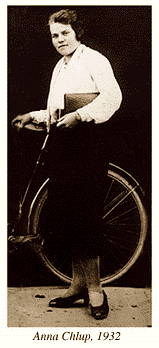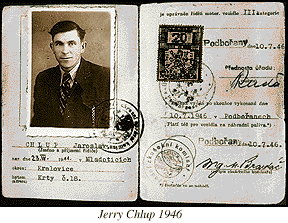
Anna and Jaruslav Chlup were born in Czechoslovakia in 1910 and 1911. They grew up in small villages close to the Sudetenland. When Anna was twenty-two, her parents built a new house just outside of the village of Sedlice, near the border town of Zihle. Her father owned a small grocery store that supplied the farming families in the area.Anna met Jerry at the start of World War Two, when she was twenty-eight years old. They were married the same year. In the early years of their marriage they lived with Anna's parents in the family home. Jerry commuted about thirty miles each day to a factory near Pilsen where he worked as a cabinet maker. Anna helped her father run his store.
 ANNA CHLUP: I was afraid to marry; I don't know why. I liked my mother and father, and didn't want to leave them. I used to tell my mother that I would never get married because I didn't want to wash some strange guy's underwear. I'm not sure what made me change my mind. It may have been my age, or because I saw that all my friends were married while I was still single.
ANNA CHLUP: I was afraid to marry; I don't know why. I liked my mother and father, and didn't want to leave them. I used to tell my mother that I would never get married because I didn't want to wash some strange guy's underwear. I'm not sure what made me change my mind. It may have been my age, or because I saw that all my friends were married while I was still single.
I got married in 1938. In 1939 Hitler came--we were afraid to have children. We heard that Hitler was going to move the entire Czechoslovak population to Morocco, and take our country for himself. He wanted our beer hops and uranium mines. Because the times were so uncertain, it seemed better to wait until after the war to have children. But after the war the Communists came in, and again we were afraid. We never had children.
My father was a businessman and a very smart guy. He always took care of all of us. We never went hungry. Sedlice was a farming community, with no poor or working class people. If a family had a cow, a chicken, and a pig, they had milk, butter, and eggs and meat. Everyone could eat.
Every morning my father and I went to work in the village. Every evening we closed up the store and went home again. We heard very little about the war because there was no foreign news in our newspapers. Of course we knew about it when Pilsen was attacked, but that was the Americans, and it was only two or three times. The Gestapo and S.S. stayed over in Kralovice on their army base. They left us alone in Sedlice.
I remember one trip to Pilsen just before Christmas. My father and I had gone there to do some shopping for the store. While we were in the city the American planes came over and bombed. We went into the underground shelters with everyone else until it was over. Aterwards we tried to take the train back home, but the bombs had destroyed the railroad station and we had to walk all the way back to Sedlice--about ten hours.

I remember one evening in 1942, about 7 o'clock, a policeman--a family friend--brought an older couple to our house. They were maybe thirty-five or thirty-six years old. The policeman had caught them as they were trying to cross the border to Sudetenland, on their way to Pilsen. Why they were running to Pilsen, I don't know--there were so many Germans there. The policeman took the woman to my room, and told me to look her over to see if she had a gun. These people didn't even have a suitcase, just handbags. He checked the man, but I didn't search her. Then he took them back to where they had come from. Around 11 or 12 o'clock that same night there was a knock on my parents' bedroom window. They had come back. Would someone please show them the way to Pilsen? My father got up from his bed, and walked with them for a long, long way--more than two hours--far across the forest, and put them on the highway. What happened to them after that, I never knew.

I'll tell you something we did know about--forced labor. The Germans took all the young men and women from Sedlice who were born in 1922, to work in Germany. Married, or not, everybody had to go. Luckily I was too old, and so was Jerry. Our village was not big so it didn't concern too many people, but my sister's son was born in 1922, and he had to go. He wrote to my mother from the camp in Germany, "Grandma, please send a letter saying you are very sick so they will let me come home to take care of you." My mother sent the letter, but they didn't let him go. They didn't care. He tried to escape, but they caught him and beat him. Then they put him on a train that went around and around, back and forth all over Germany, because by then it was 1944, and the Americans had started bombing.
My nephew had been a big, tall man like Jerry, but when he came back from Germany in 1945, he looked very bad--only skin and bones. When we went to visit him in the hospital, it was terrible: the hospital was full of young people from the labor camp, and they all had these big lice--even after they bathed them. I think they were coming out of the wounds. He asked my mother to bring him home with her, which she did, but he was very sick. My mother told my sister that she had to come and take him. He died just a short time later--only twenty-four years old. My sister became a Communist later on; I think losing her son pushed her into it. I don't know why she thought the Communists would help; her son was already dead.